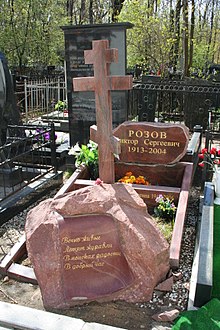Viktor Sergeyevich Rosov
Viktor Sergeyevich Rosow ( Russian Виктор Сергеевич Розов , scientific. Transliteration Viktor Rozov Sergeevič ; born August 8 . Jul / 21st August 1913 greg. In Yaroslavl , † 28. September 2004 in Moscow ) was a Russian dramatist of the post-war period . He wrote around 20 plays , many of which were aimed at young audiences.
Life
Rosow was born in the Volga metropolis of Yaroslavl as the son of an accountant. In 1918 the family house burned down during the unrest leading up to the Russian Civil War , whereupon the Rosows first moved to the small town of Wetluga and later to Kostroma . Wiktor completed nine school classes there and then worked in a textile factory. From 1932 to 1933 he studied at a vocational school in Kostroma, but at the same time he increasingly devoted himself to theater: first Viktor Rosow worked as an amateur actor at the children's and youth theater in Kostroma, in 1934 he went to Moscow , where he succeeded in studying the drama school of the Theater of the Revolution .
After four years Rosow graduated and played for a few months within the reserve squad of the Theater of Revolution. After the outbreak of World War II , he was called to the front, where he was seriously wounded near Vyazma in autumn 1941 . After his discharge from the hospital, which did not take place until the summer of 1942, Rosow returned to Kostroma, a little later he took up a distance learning course in dramaturgy at the Moscow Maxim Gorky Literature Institute . In the further course of the 1940s, Rosow worked in several theater touring troupes and at the youth theater in Alma-Ata , the latter in collaboration with the well-known director Natalija Saz .
While he was still in Kostroma, Rosow wrote his first play called The Eternal Living (Russian Вечно живые ). It is a love drama in which Rosow also processed his own experience of the war. This drama was used in 1957 as a template for the Soviet film The Cranes Pull ( Летят журавли ), which also gained notoriety outside of the Soviet Union .
Rosov was only able to fully complete his studies at the Moscow Literature Institute in 1953. In 1958 he became a seminar leader in the subject of dramaturgy and received the title of professor in 1973. From the late 1940s to the 1980s, Rosow wrote around two dozen plays, several of which served as models for feature film scripts. Rosow was a member of the Soviet Writers' Union and since 1958 a member of the editorial board of the well-known youth magazine Junost .
Rosow was married to Nadezhda Koslowa, who was six years his junior, and raised two children, both of whom also made theater careers. His grave is in the Vagankovo Cemetery in Moscow.
plant
Most of Rosow's plays are dramas that are more likely to target teenagers and young adults. Embedded in everyday Soviet life, the actions have a social-psychological character, the main characters are typically in search of themselves, they sometimes rebel against the values of the "bourgeois" society. Often the pieces combine elements of love drama with humor. Viktor Rosow has received several awards for his work, including the Order of the Red Labor Banner , the Order of Merit for the Fatherland and the Order of Mercy from the Russian Orthodox Church .
Plays
- Вечно живые (1943; Eng . The Eternal Living )
- Её друзья (1949; Eng . Your friends )
- Страницы жизни (1953; German pages of life )
- В добрый час! (1954; German broken neck and leg )
- В поисках радости (1957; Eng . In search of joy )
- Неравный бой (1960; German unequal fight )
- Перед ужином (1961; German before dinner )
- В дороге (1962; eng . On the way / on the way )
- В день свадьбы (1964; German on the day of the wedding )
- Затейник (1966; Ger . The cultural director )
- Традиционный сбор (1967; German class reunion )
- Шутник (1967; German joker )
- С вечера до полудня (1970; German from evening to noon )
- Мальчики / Брат Алёша (1971; German brother Aljoscha )
- Ситуация (1973; German situation )
- Четыре капли (1974; German four drops )
- Гнездо глухаря (1978; eng . The grouse's nest )
- Кабанчик (1981; Eng . The Freshman )
- Дома (1989; German home )
- Скрытая пружина (1989)
- Гофман (1991)
Eponyms
The asteroid (4070) Rozov , discovered on September 8, 1980, was named after him in 1994.
Web links
- Literature by and about Wiktor Sergejewitsch Rosow in the catalog of the German National Library
- Viktor Rosow on krugosvet.ru (Russian)
- Obituary on requiem.ru (Russian)
- Kostromag.ru: Viktor Rosow (Russian)
Individual evidence
| personal data | |
|---|---|
| SURNAME | Rosow, Viktor Sergeyevich |
| ALTERNATIVE NAMES | Rosow, Viktor; Rozov, Viktor Sergeevič; Розов, Виктор Сергеевич (Russian spelling) |
| BRIEF DESCRIPTION | Russian playwright |
| DATE OF BIRTH | August 21, 1913 |
| PLACE OF BIRTH | Yaroslavl |
| DATE OF DEATH | September 28, 2004 |
| Place of death | Moscow |
